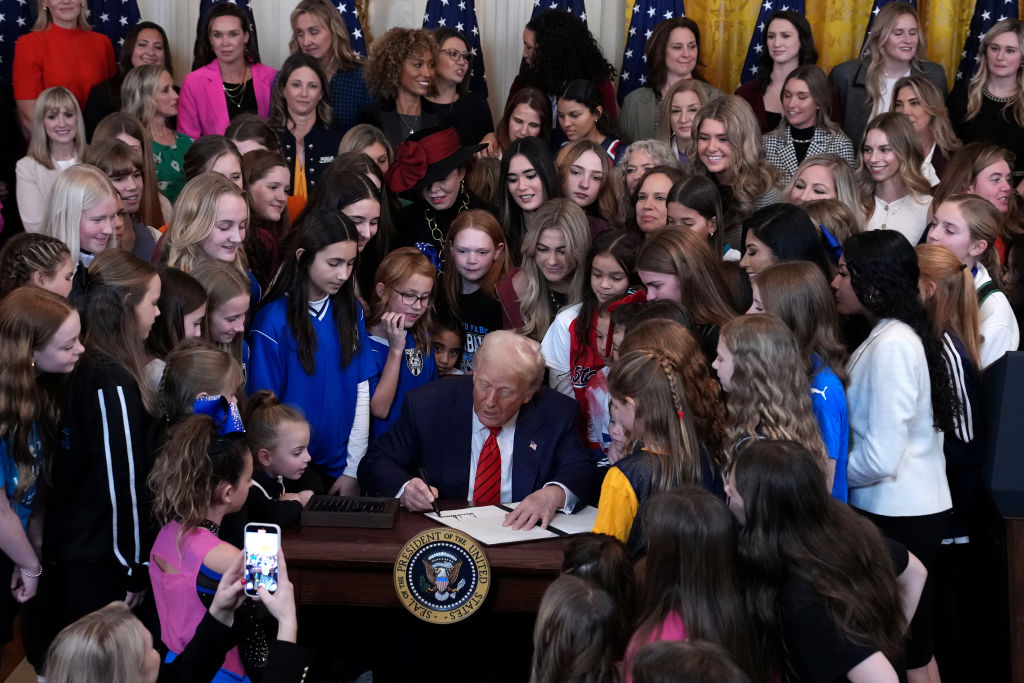Maine high schools allow males to play on girls’ teams. Gov. Janet Mills said she ‘will not be intimidated by the president’s threats.’
President Donald Trump and Maine Gov. Janet Mills got into a verbal altercation over transgender participation in sports during a White House event on Friday.
Trump, while reiterating his executive order that prohibits males from competing as females, accused Mills of allowing her state to violate that policy.
He said during a work session that Maine had better comply with the executive order or it would not receive any federal funding. The exchange occurred during the annual winter meeting of the National Governors Association.
Mills responded: “We’re going to follow the law, sir. See you in court.”
The exchange ended with Trump remarking, “Enjoy your life after, governor, because I don’t think you’ll be elected in politics.”
The disagreement began the day before at the Republican Governors Association Dinner, when Trump made similar remarks.
“And I heard men are still playing in Maine,” he said during the Feb. 20 Republican Governor’s Association Dinner in Washington, before asking if any attendees were from that state. A man raised his hand as being from Maine.
“I hate to tell you this, but we’re not going to give any federal money. They’re still saying we want men to play in women’s sports, and I cannot believe they’re doing that. So, we’re not going to give them any federal funding—none whatsoever until they clean that up.”
Trump did not identify any K–12 school district or college accused of violating his policy.
The president noted that the NCAA has already pledged to prohibit males from competing as women.
Mills issued a statement on Friday responding to Trump’s remarks.
“If the President attempts to unilaterally deprive Maine school children of the benefit of federal funding, my administration and the attorney general will take all appropriate and necessary legal action to restore that funding and the academic opportunity it provides,” she said. “The state of Maine will not be intimidated by the president’s threats.”
The Feb. 5 executive order cites Title 9 regulations, which state that an educational institution receiving federal money cannot deny women an equal opportunity to participate in sports. Federal courts have recognized, it notes, that “ignoring fundamental biological truths between the two sexes deprives women and girls of meaningful access to educational facilities.”
The Maine Principal’s Association, which governs interscholastic high school sports in that state, maintains a Gender Identity Participation Policy that states a student can participate in sports in accordance with either their biological sex or their “gender identity” without having to provide documentation or medical records that verify their gender.
“A transgender student shall be eligible to participate in accordance with either their birth sex or in accordance with their gender identity, but not both. For example, a transgender student who was assigned male at birth may play field hockey in the fall but cannot try out for the boys’ basketball team in the winter (assuming they continue to identify as a girl),” the policy states.
The policy also states that “a non-binary student may select the gendered team on which they feel most comfortable participating.”
In January, the Maine Department of Education issued guidance to school districts that said state laws and locally adopted school policies supersede Trump’s executive orders regarding gender ideology.
“Maine [School Administrative Units] are expected to abide by the Maine Human Rights Act (MHRA), which prohibits discrimination on the basis of protected class in employment, housing, places of public accommodation, education, and extension of credit. Protected classes include race, color, ancestry, national origin, sex, sexual orientation or gender identity, physical or mental disability, religion, age, and other categories in certain contexts. The MHRA also prohibits retaliation for asserting MHRA-protected rights,” it said.

